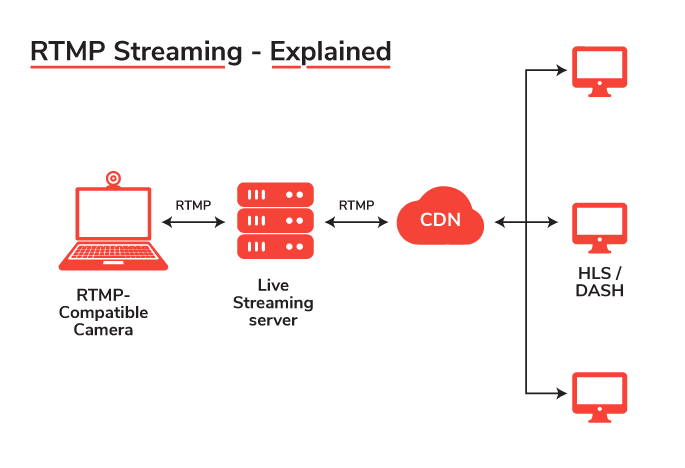No products in the cart.
RTMP Server Hosting: What It Is and How to Access It
What is RTMP Exactly?
The technology predates the mainstream use of cellular devices, and it’s been modified to stream across almost all devices.
Today, there are many variations of technology in circulation. RTMP proper, or real-time messaging protocol proper refers to the classical version of RTMP streaming technology and is often used as a yardstick to measure other RTMP variations such as RTMPE, RTMPT, RTMFP, and RTMPS.
The highly adaptable nature of this technology explains its popularity and widespread usage. The technology is known for its ability to transmit recorded or live videos with minimum lag across streaming platforms. We all know the importance of maintaining the audience’s interest and attention. However, even slight delays in buffering can cause viewers to switch to another video stream or live stream. That’s the issue RTMP streaming aims to resolve.
How Does RTMP Streaming Work?
RTMP is not hardwired but a streaming software that can be changed to suit your internet speed, video quality, and other variables. An RTMP stream divides a pre-recorded video or live stream into smaller pieces of customized size before sending it from one device to another. The size of each smaller fragment is set according to the internet connection available at both ends.
The size of the video’s chunks can be changed according to need. RTMP technology performs well even though your internet connection might not be the smoothest and fastest.
That’s precisely why RTMP streaming technology has been vital to the history of internet video streaming. The role of RTMP protocol in streaming has evolved, adapting to fit the needs of modern live streaming setups.
The Role of RTMP Servers
The importance of RTMP stream hosting has increased in recent years because RTMP streams and RTMP encoders help broadcasters deliver low-latency streams to their viewers, creating a better end-user experience.
Now that we’ve covered the importance of RTMP stream technology in streaming, we’ll cover everything broadcasters need to know about RTMP stream hosting, RTMP protocol, RTMP encoder technology, and where to use an RTMP stream.
Additionally, we’ll cover RTMP server hosting, the benefits of RTMP, and how you can access an RTMP server host for your streaming server needs.
Then we’ll end with the connection between RTMP and HLS and how this relates to broadcasters.
RTMP: A Closer Look
RTMP has been significant throughout the history of online live streaming.
RTMP stands for real-time messaging protocol and is a transport protocol that moves video files from one part of the live streaming workflow to the next. RTMP was designed by Macromedia, now owned by Adobe, to deliver video content to the Adobe Flash player.
Today, RTMP is most widely used for RTMP ingest rather than delivery since it is not compatible with HTML5 video players, which are the industry standard.
RTMP is known for its low video latency streaming and live streaming capabilities. It maintains a constant connection and splits streams into smaller chunks to transmit over the internet. RTMP uses the constant connection between the source and destination to determine the appropriate size of these chunks to send.
There are a few variations of RTMP that serve slightly different purposes. These include RTMPE, RTMPT, RTMFP, and RTMPS. The “regular” RTMP is referred to as “RTMP proper” when compared or discussed in terms of these other variations. RTMPS. is particularly valuable for streaming on cell phones over public internet networks since it is encrypted with an extra layer of security.
For more details : https://www.mslivestream.com/
CONTACT US : 7305712345
Tagged with: rtmp server


